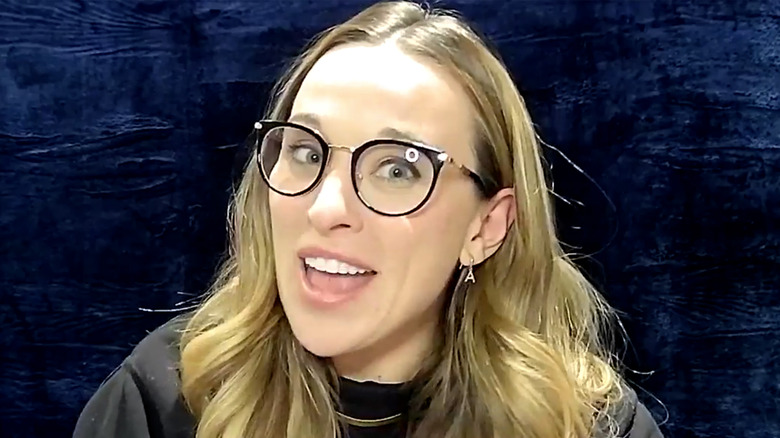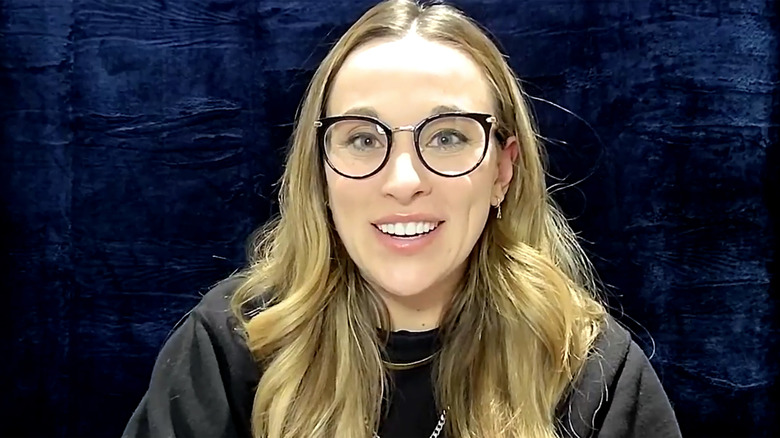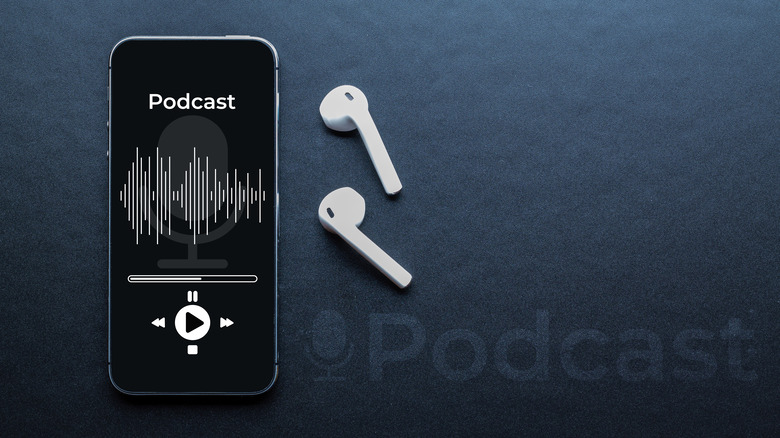The Untold Truth Of Crime Junkie
Podcasts are on an upward trend and have been for a while. Grit Daily reports that 2020 saw a 37% increase in podcast listening, with around 80 million Americans tuning into podcasts regularly. Many of those 80 million tune into true-crime podcasts, particularly "Crime Junkie," one of the most popular shows in the country, hosted by childhood friends Ashley Flowers and Brit Prawat.
"Crime Junkie" is the dream show for Flowers, who is a lifelong true-crime obsessive. While volunteering for her local Crime Stoppers organization, Flowers was handed the role of connecting with millennials and Gen Z, as she was the youngest member of the organization. This turned into a local radio show, where she would report on a case once a week while advertising for Crime Stoppers. The show became the most popular segment on the station, and in December 2017, Flowers decided to transition into the world of podcasting to create the exact kind of show she would want to listen to. With that, "Crime Junkie" was born.
Crime Junkie was born out of passion
According to WTHR, the show was quickly a hit, even with the stiff competition in the true-crime podcast scene, gathering thousands of downloads within its first couple of weeks. While part of that success comes from the small but dedicated fan base accrued from her Indiana radio show, the most significant factor of "Crime Junkie's" success is the clear passion and enthusiasm for true crime displayed by Flowers and Prawat.
Flowers remembers watching "Columbo" and reading "Nancy Drew" as a child, which inspired her lifelong fascination with crime and mysteries that is reflected by many Americans, particularly women in their 20s and 30s, which make up around 90% of the podcast's audience. Flowers had consumed nearly every true-crime podcast there was, and set out to make a show for herself and similar obsessives that would scratch the itch other shows couldn't. Within 15 months, "Crime Junkie" was one of the top five podcasts on Spotify, but controversy would soon loom over the runaway success.
Crime Junkie attracted plagiarism claims
As the podcast soared to become the No. 1 true-crime show in the country — no mean feat given the popularity of the genre — so too did the controversy surrounding it. While the show was well-known for the extensive research put in by Flowers, some 30 hours per episode, according to the host, a journalist named Cathy Frye claimed that an episode on Kacie Woody was largely based on her four-part series about the murdered teenager in 2003; Flowers had failed to attribute Frye as a source (via Variety).
This sparked a wave of journalists and writers who felt that other episodes of the podcast also mirrored their writings, sometimes verbatim, without any mention of sources. Some of the complaints were from Reddit users who found that their own personal write-ups of cold cases and murders were being read on the show, again without any citations from Flowers. Episodes were removed, with Flowers stating that "source material could no longer be found," but the show's popularity did take a hit from the claims: The podcast lost its No. 1 spot soon after (via Arkansas Online).
The controversy continued
Controversy against "Crime Junkie" goes further than claims of plagiarism, however, and can be extended to the entire genre of true crime. Indianapolis Monthly details a sold-out live show where Flowers and Prawat discussed the murder of a young girl that still had a pending investigation; the hosts indirectly implicated the girl's father, given his slightly nonchalant 911 call. While the audience was goaded into believing that the victim's father was a suspect, when in reality a local known sex offender was the true culprit.
Many question the morality of the true-crime genre, where the gruesome endings of innocent lives are turned into entertainment. While Flowers has maintained that she diligently researches to maintain respect for the victims, "Crime Junkie's" status as the biggest true-crime podcast around carries extra responsibilities that other shows don't have; for example, even if the hosts put a disclaimer that a theory is just a local rumor that isn't substantiated, they still broadcast the rumor to millions of listeners.
Flowers' media company continues to grow
While her flagship podcast has seen some controversy over the years, Ashley Flowers and her media company Audiochuck have continued to grow. In October 2021, Audiochuck signed a multiyear deal with SiriusXM that gives the radio giant ad sales exclusivity for "Crime Junkie" and other shows on the podcast company, like "Anatomy of a Murder" and "Park Predators" (via Variety). Part of the deal also has all of Audiochuck's shows distributed on SiriusXM's Stitcher platform, with further collaborations with Pandora to come.
Audiochuck's growth as a podcast production company has allowed Flowers to delve into other genres while also supporting upcoming podcasters on her label. According to Pop-Culturalist, Flowers produces "CounterClock," guiding a new host, while also creating the new "Supernatural" podcast, which gives a paranormal, surreal twist to typical true-crime shows. All the while, "Crime Junkie" remains a top 5 podcast across the country, regularly topping end of the year popularity lists.
Crime Junkie remains extremely popular
So much has happened since the debut of "Crime Junkie" that it's pretty startling to remember that the show only began in late 2017, not even four years old at the time of this writing. According to the podcast's website, "Crime Junkie" has seen over half a billion downloads of its 630 episodes, with an additional $643,000 raised for charity in the whirlwind few years that saw Flowers go from local radio host to national podcast celebrity.
The show has vaulted to the top of the podcast charts through its dedication to the eponymous "crime junkies" that make up its target audience, riding the wave of true-crime television shows and podcasts that seem to grow in popularity every year. "Crime Junkie" has courted controversy with its plagiarism cases, along with taking the brunt of criticism aimed at the true-crime genre in general. However, given how far the show has come in such a relatively short time, Ashley Flowers has seemingly no limits to where she can take the podcast and her company next.





